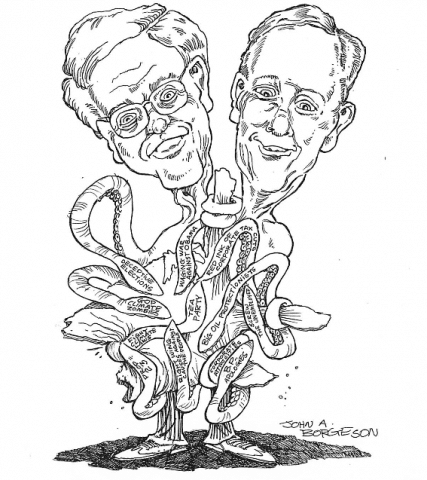It is nearly impossible to discuss the vast climate change denial echo chamber and not mention the Koch Brothers, Koch Industries, and what some have called the Koch Empire.
Perhaps unsurpisingly then, the origins of the Heartland Institute – whose internal documents were recently leaked to DeSmogBlog – have a direct historical link to the rise of the Kochtopus’s wide-reaching climate change denial machine.
It all began in 1977 in Wichita, Kansas, with the creation of the Cato Institute.
David Padden, Cato Institute, and the Rise of Heartland
The Cato Institute was founded in 1977 and originally funded by Charles Koch, of Koch Industries fame and fortune.
It is known today for its libertarian policy stances on issues like the War on Drugs, anti-interventionist foreign policy, and support for civil liberties, and perhaps most notoriously for its climate change denial and pro-polluter stance in energy policy debates. Cato’s most infamous talking head today is Pat Michaels, who serves as its “Senior Fellow in Environmental Studies.”
One of the key original members of Cato’s Board of Directors was David Padden, a Chicago, IL-based investment banker and then owner of Padden & Company, which now also has a spinoff called Padco Lease Corporation. Padden passed away in October 2011.
In 1984, piggybacking off of his role at Cato, Padden founded the Heartland Institute, also serving on its original Board of Directors.
Padden also served on the original Board of Directors of another organization founded that year, Citizens for a Sound Economy, now known as both FreedomWorks and Americans for Prosperity. Both of these echo chambers recieved their initial seed money from the Koch family fortune.
Padden also served as the original co-chairman with Joseph Bast at Heartland, while U.S. Rep. Ron Paul (R-TX), a current Republican Party candidate for the 2012 election, was the first chairman of Citizens for a Sound Economy.
Koch Empire Funds Heartland Climate Change Denial Echo Chamber
Between 1986 and 2009, the Koch Empire gave $75,000 to the Heartland Institute, according to Greenpeace USA‘s PolluterWatch project. During that same time period, the Empire gave just under $14 million to Cato, over $7.5 million to Citizens for a Sound Economy (now known as FreedomWorks and Americans for Prosperity), and over $5.5 million to Americans for Prosperity, according to PolluterWatch.
Prior to his death, Padden had affiliations with all of these outfits.
Joseph Bast, the current head of Heartland, served as Founding Director, officer, and member of the executive committee of the State Policy Network (SPN). He is on the Board of Advisors of the Illinois Policy Institute (IPI), a member of SPN.
SPN received $39,000 from the Koch Empire between 1986 and 2009, according to PolluterWatch. IPI, meanwhile, does not make its funding sources publicly available, but its 2006 annual report shows that it received $50,000 from the Cato Institute that year.
Heartland Exposed: Sowing the Seeds of Doubt
As DeSmogBlog has made clear through Heartland Exposed, Heartland, and the vast echo chamber it is a part of, are still hard at work “sowing the seeds of doubt” on climate change.
Heartland and its affiliates are a small, but vocal part of the deeply-intertwined, well-funded machine undermining democracy and delaying action to address an ever-worsening climate change crisis.
And at the center of it all, lo and behold, is the Kochtopus Empire.
Explore this Prezi infographic created by the International Forum on Globalization to learn more about the tentacles of the Kochtopus:
Subscribe to our newsletter
Stay up to date with DeSmog news and alerts






